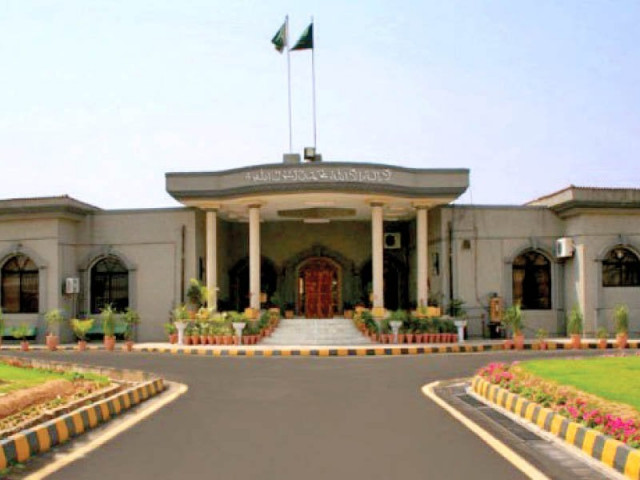JCP recommends Babar Sattar, Tariq Jahangiri as IHC judges
The nominations will be forwarded to Parliamentary Committee on Judges Appointment

The Judicial Commission of Pakistan (JCP) has approved the nomination of renowned lawyers Babar Sattar and Tariq Jahangiri as additional judges of the Islamabad High Court (IHC).
A meeting of the JCP on Thursday, with Chief Justice Gulzar Ahmed in the chair, considered the recommendation of two lawyers sent by IHC Chief Justice Athar Minallah. Sources told The Express Tribune that the commission approved both the nominations.
According to the sources, the meeting continued for more than one hour, during which a couple of JCP members raised certain reservations on the two nominees but ultimately, all members agreed to the recommended names.
It is learnt that Law Minister Dr Farogh Naseem could not attend meeting because of coronavirus infection. Also, a retired judge, Dost Muhammad Khan, was also not present in the meeting. The remaining members, including Justice Mushir Alam, Justice Umar Ata Bandial, Justice Qazi Faez Isa, Justice Maqbool Baqar, IHC Chief Justice Athar Minallah, IHC judge Justice Amir Farooq, Attorney General for Pakistan Khalid Javed Khan, Pakistan Bar Council representative Akhtar Hussain and Islamabad Bar Council representative Qazi Rafiudin, were present.
Now, the JCP recommendation will be sent to the Parliamentary Committee on Judges Appointment, which comprises eight members. The parliamentary committee can reject the nominations with a three-fourths majority.
Babar Sattar is a renowned legal analyst and has been known as a vocal lawyer. He was part of Justice Qazi Faez Isa’s legal team, which had challenged the presidential reference against him.
Pakistan Bar Council Vice Chairman Abid Saqi welcomed the approval of both nominations. He said that approval of “both nominees is victory of progressive and enlightened people”.
Sindh High Court Bar Association (SHCBA) President Salahuddin Ahmed also hailed the nomination of Babar Sattar, saying that it was a heartening news for the legal fraternity that the JCP has chosen a well-qualified, professional and, most importantly, an independent-minded person to join the judiciary.
“Earlier some doubts were expressed about his nomination from some quarters apprehensive of his penchant for bold and vocal speeches; but we are glad that the commission has ignored those and made an excellent decision on merits,” Ahmed said.
“His addition to the bench will only enhance the reputation of the judiciary and we are hopeful that this represents a step forward for the rule of law in Pakistan,” the SHCBA president added.
The Islamabad Bar Council representatives also lauded the JCP decision to approve the nomination of Tariq Jahangiri, who served as the president of the Islamabad High Court Bar Association in 2016.
Jahangiri was the advocate general of Islamabad in 2017-18. He also worked as deputy attorney general for Pakistan from 2011 to 2013 and the National Accountability Bureau (NAB) Rawalpindi/Islamabad Region deputy prosecutor general from 2009 to 2010.
The JCP is a constitutional body which has a key role in appointing judges to the superior courts. The forum also confirms services of the additional judges of high courts. Senior lawyers have appreciated Chief Justice Gulzar Ahmed for making the JCP meetings meaningful during his tenure.
The five senior-most judges of the Supreme Court, including the chief justice of Pakistan, a retired SC judge, the Attorney General for Pakistan (AGP), the federal law minister and a representative of the Pakistan Bar Council (PBC) are permanent members of the commission.
Under the JCP rules 2010, the commission proceedings are conducted in-camera. For the last one decade, representatives of the superior bars have been complaining that non-judicial JCP members had been given no opportunity to give an effective input on the nomination of judges in the meetings.
They even alleged that the JCP members, belonging to the judiciary, took all decisions unilaterally even before the commission’s meetings. Due to this alleged practice, the commission’s proceedings were becoming meaningless.
Some non-judicial members – including the PBC representative, the AGP and the law minister – had even boycotted the JCP’s meetings during the tenure of former chief justice Iftikhar Muhammad Chaudhry.
However, several members of the JCP have now confirmed that the incumbent JCP chairman has brought more openness to the commission’s meetings in which detailed discussions have taken place now.
Every member is being allowed to express his opinion freely on any issue. Even member judges are giving dissenting opinions on the nominees. Recently, two JCP members have disagreed with a majority opinion regarding elevation of a judge to the apex court.
The lawyers appreciate detailed discussions on the credentials of the nominees and the fact that the representatives of the superior bars are also consulted before referring the names to the JCP.
In April, the JCP had refused to entertain an unsigned report of intelligence agencies in the process of appointment/confirmation of superior court judges. The commission had also resolved that it would not consider the agencies’ reports that lack supportive material to substantiate their findings.
It was also agreed that the government representatives – the AGP and the law minister – might summon agencies’ reports for their own consideration but the JCP could not entertain them until they were duly signed by the officials concerned and were attached with supportive material.



















COMMENTS
Comments are moderated and generally will be posted if they are on-topic and not abusive.
For more information, please see our Comments FAQ